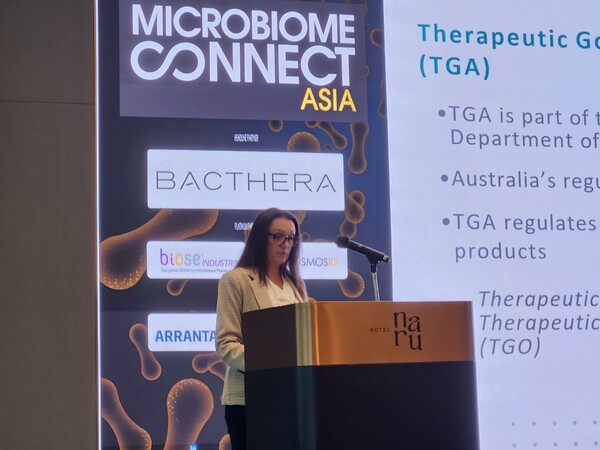Fecal microbiome transplants (FMT) offer a clinical cure for antibiotic-resistant therapies. However, the industry is focused on developing cultured microbiome strains, said a regulatory expert from Australia.

BiomeBank Head of Regulatory Affairs, Mirjana Rapaic, presented on her company’s journey towards the world’s first market authorization for a donor-derived microbiome-based product at Wednesday's Microbiome Asia Conference in Seoul.
BiomeBank’s Biomictra received its first-in-class approval as a donor-derived microbial therapy for restoring gut microbiota in managing gastrointestinal disorders and reducing recurrent or refractory Clostridium dificile infections (CDI).
“Since our approval, the U.S. FDA has followed with two more recent approvals for CDI, setting the standard for this new therapy,” she said. “Our data showed donor efficacy was critical to resolving recurrent and refractory C.difficile infections compared to current first-line treatments such as vancomycin.”
Sharing her experience developing the first approved FMT therapy, she said, “TGA asked us to include SARS-CoV2 screening as the Covid-19 pandemic was ongoing, together with laboratory pathology testing and validation to rule out other infectious diseases.”
In this regard, she noted the strict donor screening process to minimize risk to the patient, which conforms to the TG-105 standard devised by Australia’s therapeutic goods administration (TGA) in 2018.
“TGA recognized the development of clinical practice guidelines regarding the administration and patient preparation of FMT therapies would be helpful before the use of bacteria transfer therapies became widespread,” she said, commending the TGA’s early efforts to establish this field.
Rapaic explained that BiomeBank is constantly monitoring for epidemiological risk by screening for the healthiest donor with the least ongoing risk of exposure to transmissible diseases. This includes a quarterly literature review of donor screening epidemiology and a follow-up for eight weeks for the patient.
“As FMT microbiota changes with each donor, it's impossible to standardize the composition, but we can standardize the process for GMP from donor approval, collection of starting materials, manufacturing process, freezing, and release of the supply to transportation,” she explained.
Based on the manufacturing facility’s good manufacturing practices and the biological dossier submission, the TGA grants approval.
Related articles
- ‘Mixed culture microbiome therapeutics is holy grail but repeatability remains an issue’
- Microbiome Asia to showcase Korea's rapidly growing microbiome industry
- Korea's microbiome industry shows robust growth despite late start, experts say
- CJ Bioscience targets microbiome-based new drugs
- Korean companies set high expectations for microbiome industry
- BioMe, Celltrion working on FMT capsule to target resistant enteric infections
- KoBioLabs receives state funds to develop microbiome-based autism treatment

